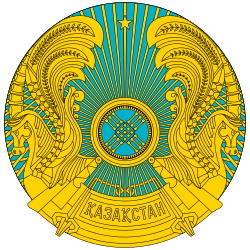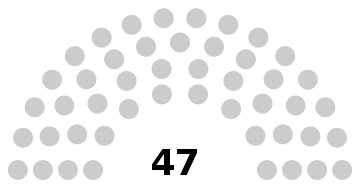Parliament of Kazakhstan
| Parliament of the Republic of Kazakhstan Қазақстан Республикасының Парламенті (Kazakh) Парламент Республики Казахстан (Russian) | |
|---|---|
 | |
| Type | |
| Type | |
| Houses |
Senate (upper) Mazhilis (lower) |
| Leadership | |
|
Bauyrzhan Dosmagambetov (Nur Otan) | |
Chairman of the Majilis | |
| Structure | |
| Seats |
154 members Senate: 47 (32 elected and 15 appointment by the president) Mazhilis: 107 (98 seats from party lists & 9 from the Assembly of People of Kazakhstan |
 | |
Political groups |
Government (47) Non-partisan (47)
|
 | |
Political groups |
Government (84) Opposition (14) |
| Elections | |
| Election by regional legislatures, Appointment by the President of Kazakhstan | |
| Proportional representation, Election by the Assembly of People of Kazakhstan | |
Last election | Kazakhstani legislative election, 2016 |
| Meeting place | |
| Astana | |
| Website | |
|
www | |
 |
|---|
| This article is part of a series on the politics and government of Kazakhstan |
|
The Parliament of the Republic of Kazakhstan (Kazakh: Қазақстан Республикасының Парламенті, translit. Qazaqstan Respýblıkasynyń Parlamenti; Russian: Парламент Республики Казахстан, tr. Parliament Respubliki Kazakhstan) is the bicameral legislature of Kazakhstan, according to the 1995 Constitution of Kazakhstan. The lower house is the Mazhilis, with 107 seats, (98 seats are from party lists, 9 - from Assembly of People) which are elected to four year terms. The upper house is the Senate, which has 47 members. As of January 2007, 10% of the parliament's representatives are women and 19% of local and city council officials are women.[1] Its predecessor was the Supreme Soviet.
Elections
Kazakhstan held elections to the Senate on 1 October 2014.[2] According to the Central Electoral Commission of Kazakhstan, it was "an open and democratic electoral process".[2] According to the OSCE, "Preparations for the 26 April election were efficiently administered, however, necessary reforms for holding genuine democratic elections still have to materialize. The predominant position of the incumbent and the lack of genuine opposition limited voter choice. A restricted media environment stifled public debate and freedom of expression.[3]
About 250 observers from the Commonwealth of Independent States and the Shanghai Cooperation Organization were present for the voting.[2] Four women were among the 80 candidates vying for the 16 open Senate seats.[2] The results were announced on 7 October 2014.[2]
See also
References
- ↑ Kazakhstan: Presidential adviser spells out advances by women RadioFreeEurope/RadioLiberty
- 1 2 3 4 5 "Kazakhstan holds Senate elections "without incident"". Fox News Latino.
- ↑ "OSCE ELECTION OBSERVATION MISSION Republic of Kazakhstan - Early Presidential Election , 2 April 2015 STATEMENT OF PRELIMINARY FINDINGS AND CONCLUSIONS". Retrieved 15 March 2016.